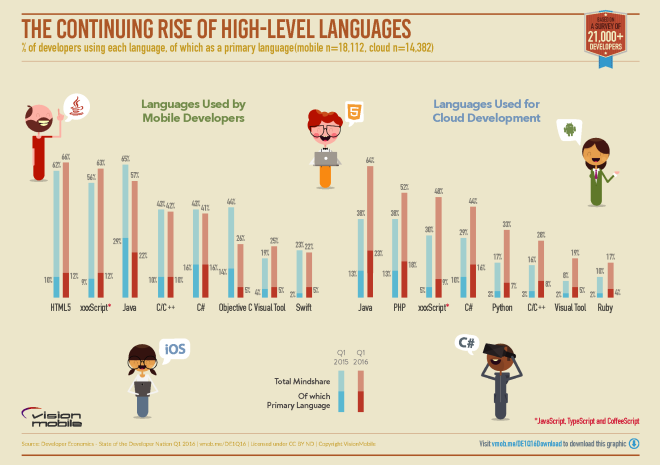Got something to say about popular platforms and apps out there? How about languages, tools, or APIs? It’s prime time to let your opinion out – our semi-annual Developer Economics survey is now LIVE! Don’t miss a chance to join over 40,000 developers from 160+ countries who take part in our surveys every year to tell us about trends and shape the future of where software development is going next. Start right away here!
Who is the Developer Economics survey for?
The survey is for pretty much everyone who gets their fingers into coding. All developers who work on software development are welcome to take the survey, whether your work on Mobile, Desktop, IoT, AR/VR, Machine Learning & Data Science, Web, Backend, or Games.
What sort of questions is the survey asking?
We ask stuff that all developers care about. Career? Check. Satisfaction with tools? Check. Future trends and what will matter in the years to come? You bet.
As always, the survey asks you questions like:
- Which are your favourite tools and platforms?
- What are some must-have developer skills today?
- Are you working on the projects you would like to work on?
- Where do you think development time should be invested?
This time, we added new questions about developer skills, so your first-hand insights are that much more important.
What do I get from it?
Apart from contributing to the developer community with your insights (and making it a better place, obviously), there are many perks. Have a look at what we prepared for you this time:
- Amazing prizes up for grabs: iPhone X, Samsung S9 Plus, HTC Vive Pro, GitHub 12 months developer program, Udemy vouchers, and more.
- Access to State of the Developer Nation 15th Edition report with the key findings from this survey (coming up in Q3 2018).
- A referral program you can join, share the survey and win up to $700 in cash!
How’s this survey different than last year?
We asked developers what they wanted to see in the 15th edition of the Developer Economics Survey. Majority of you rooted for a Sci-Fi theme and we delivered! Complete the survey and you’ll find out who is your intergalactic alter-ego and where your force lies!
What happens with my responses?
Anonymized results of the survey will be made available in the free State of the Developer Nation 15th Edition report. If you take the survey, we’ll reach out to you with the copy of the report so you can be the first to check out the insights. In the meantime, you can check out previous editions here.
So, what are you waiting for? Take the survey now!












